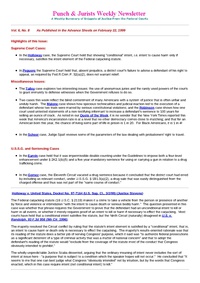The Federal carjacking statute (18 U.S.C. § 2119) makes it a crime to take a vehicle from the person or presence of another by force and violence or intimidation “with the intent to cause death or serious bodily harm.” The question presented in this case was whether that phrase …
At his sentencing on a drug conviction, the district court failed to advise the petitioner in this case of his right to file an appeal, as required by Fed.R.Crim.P. 32(a)(2). He appealed, arguing that the failure to comply with Rule 32(a)(2) was enough to vacate his sentence, without any …
Quote from an article in the New York York Times which explores the growth in incarcerations despite less crimes and reveals that one in four Black Americans can expect to spend some time in prison during their lives.
QUOTE OF THE WEEK - "Less Crime, More Criminals" - …
Case held that defendant, who, while speaking with an insurance adjuster regarding repairs to his vehicle, remarked that he was going to shoot his Congressman, lacked requisite intent under statute prohibiting threats against federal officials.
The Court held that § 115(a)(1)(B) "contains an actus reus, specifically, making a …
After his conviction on drug charges, the defendant in this case challenged the calculation of his base offense level under the Guidelines. The district court (Judge Moore) found that he was responsible for selling 3¼ kilograms of cocaine - a total which included 2 kilograms allegedly sold to the …
Once again, Judge Adelman has used logic and legal precedent - not social policy and political imperatives - to rule on a controversial issue: whether the imposition of both a 4-level enhancement, under U.S.S.G. § 2K2.1(b)(5), for using or possessing a firearm in connection with a drug trafficking offense …
Here the court approved the use of an anonymous jury even though there was no evidence that the defendant was involved in a criminal organization that included a pattern of violence or that he had ever attempted to tamper with any previous juries.
Among the many issued raised …
Here the Court held that a disparity of 262 months between the sentence imposed on the defendant (who went to trial for drug trafficking) and that imposed on his female companion (who cooperated) did not give rise to a due process claim.
Here the Court denied a claim that the prosecution violated the provisions of 18 USC § 202(c)(2) by giving leniency to a witness in exchange for her testimony, holding that such a ruling would "upset a crucial aspect of the prosecution of crime".
In this case, the defendant embezzled funds primarily from IRAs, and many of the accountholders he targeted were over seventy years old. One was over ninety. At sentencing, the only contested issue was whether the facts warranted application of U.S.S.G. § 3A1.1(b). The district court found that McCall "knew …
The court stressed that § 3148(b) singles out "the attorney for the Government" as the person who may file a motion to revoke pretrial release; and it reasoned: "Congress has spoken clearly and unambiguously. In identifying the entity or person who may initiate a revocation proceeding, §3148(b) unmistakably refers …
Although the Court held that the 1996 Amendments to the AEDPA eliminated habeas review of deportation orders, the Court recognized that a safety valve remains where deportees can seek direct review of substantial constitutional issues in the courts of appeals. (In that connection, see Singh v. reno, 182 F.3d …
In this Singleton-type case, the Court held that the admission of testimony of a witness who agrees to testify truthfully in exchange for lenience does not violate the Federal Anti-Gratuity statute (18 USC § 201(c)(2)).
Here the Court rejected a claim that the Government's "lopsided" access to evidence by using its powers to grant immunity to its own witnesses, while refusing to give the defendant the same right violated the defendant's chances of a fair trial.
Among the many issued raised in this …
Shortly after the defendant is this case was released from prison, he requested permission from his probation officer to travel to Florida with his wife, “in order to save his precarious marriage.” The probation officer denied the request on the grounds that the defendant had made false and misleading …
Judge Richard Mills is at it again. Distinguished as one of two judges who denied all motions for a new trial in one of the infamous "El Rukns" cases over which he presided - "without a hearing or consideration of further post-trial evidence" (see U.S. v. Burnside, 824 F.Supp. …
The Court’s Order in this case was only four sentences long. The Ninth Circuit summarily rejected the defendant’s request for an en banc review of his petition for habeas relief - on the technical ground that he had only asked the court to stay his pending execution in a …
Quote from an article in the New York York Times which explores the growth in incarcerations despite less crimes and reveals that one in four Black Americans can expect to spend some time in prison during their lives.
QUOTE OF THE WEEK - "Less Crime, More Criminals" - …
Judge Richard Mills is at it again. Distinguished as one of two judges who denied all motions for a new trial in one of the infamous “El Rukns” cases over which he presided - “without a hearing or consideration of further post-trial evidence" (see U.S. v. Burnside, 824 F.Supp. …
